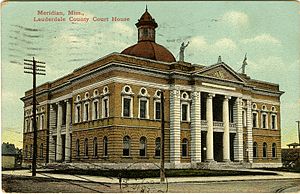Meridian race riot of 1871
| Meridian race riot of 1871 | |
|---|---|
| Part of the Reconstruction Era | |

A postcard of the Lauderdale County Courthouse, where Moore arranged a meeting encouraging freedmen in self-defense
|
|
| Date | March 1871 |
| Location | Meridian, Mississippi |
| Causes | Racial polarizing trial |
| Methods | Shootings, Lynchings |
| Result | Various killings |
The Meridian race riot of 1871 was a race riot in Meridian, Mississippi in March 1871. It followed the arrest of freedmen accused of inciting riot in a downtown fire, and blacks' organizing for self-defense. Although the local Ku Klux Klan (KKK) chapter had attacked freedmen since the end of the Civil War, generally without punishment, the first local arrest under the 1870 act to suppress the Klan was of a freedman. This angered the black community. During the trial of black leaders, the presiding judge was shot in the courtroom, and a gunfight erupted that killed several people. In the ensuing mob violence, whites killed as many as 30 blacks over the next few days. Whites drove the Republican mayor from office, and no person was charged or tried in the freedmen's deaths.
The Meridian riot was related to widespread postwar violence by whites to drive Reconstruction Republicans from office and restore white supremacy. Although the Enforcement Acts helped suppress the Klan at this time, the Meridian riot marked a turning point in Mississippi violence. By 1875 other white paramilitary groups arose; the Red Shirts suppressed black voting by intimidation, and their efforts led to a Democratic Party victory in state elections. Within two years a national political compromise was reached, and the federal government withdrew its military forces from the South in 1877.
After the American Civil War ended in 1865, the country underwent a period of Reconstruction. During this period, under the Reconstruction Acts the United States Army directly controlled the states that were formerly part of the Confederacy. This takeover was resented by white Democrats in the South, most of whom were temporarily disfranchised by service for the Confederacy. Their resentment increased with the passage of constitutional amendments making freedmen full citizens and the Voting Rights Act of 1867, which enabled freedmen to vote, serve on juries, and hold official positions in government.
...
Wikipedia
